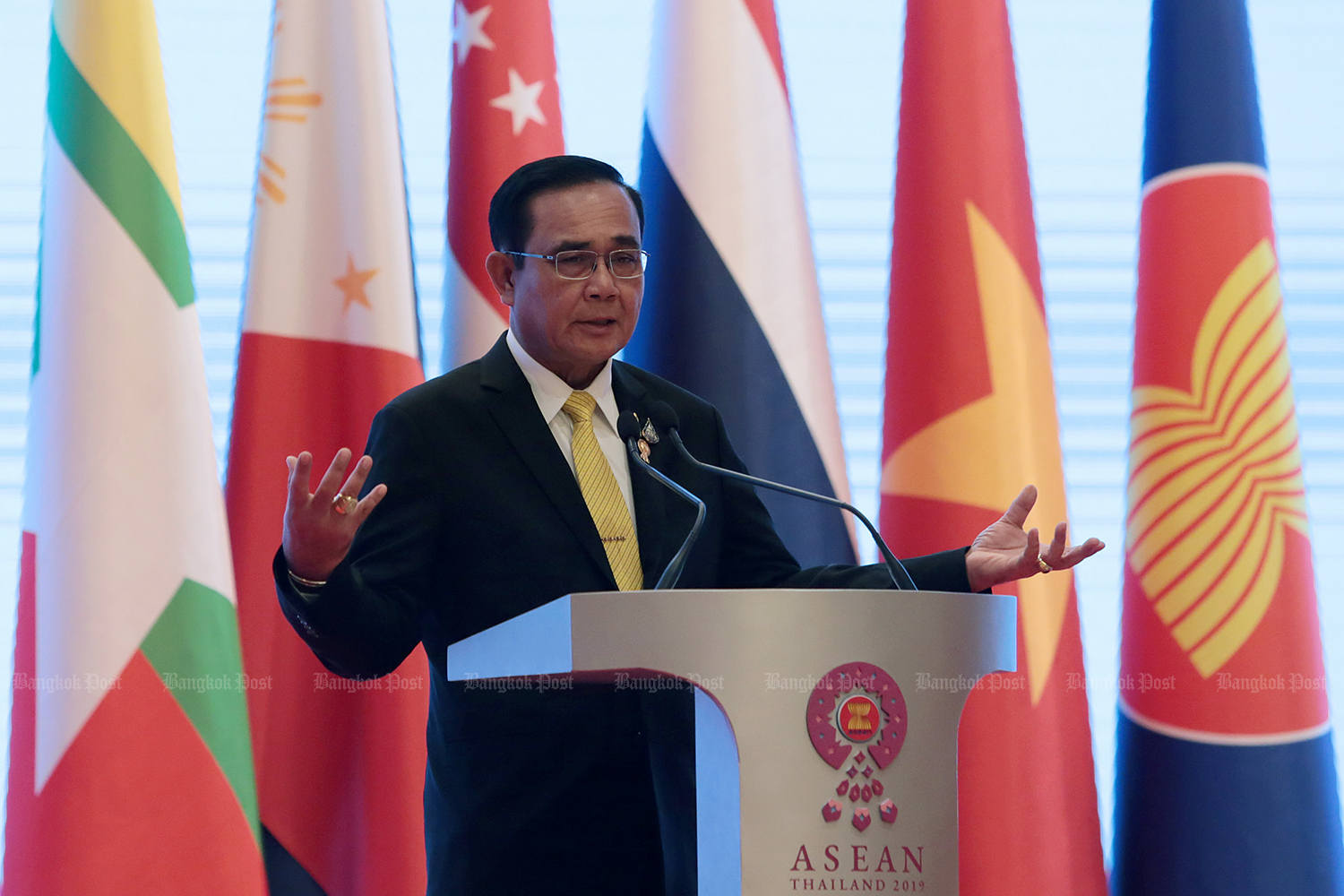
Southeast Asian leaders agreed on Sunday to work together on regional economy and security to strengthen their positions amid growing US-China tensions, as they wrapped up the summit.
The 10-member Association of Southeast Asian Nations will need its collective economic strength for bargaining power globally, especially amid the trade tensions between the world's top two economies, Prime Minister Prayut Chan-o-cha told a news conference, as chairman of the 34th Asean Summit.
Gen Prayut urged Asean nations to complete negotiations this year for the China-initiated Regional Comprehensive Economic Partnership (RCEP) pact that includes 16 countries.
"This will help Asean handle the changes and uncertainty that will happen in the region going forward, particularly the impacts of trade tension between Asean's important trade partners."
Negotiations began in 2012 on RCEP, which envisions the creation of a free trade zone encompassing 45% of the world's population and more than a third of its GDP, but does not involve the United States.
First proposed by China, RCEP's 16 signatories include the 10 Asean member states and six Asia-Pacific countries, including major economies China, India, Japan and South Korea. Asean has existing free-trade agreements with all six countries.
"If we can do this, we will have the bargaining power and base for negotiation. Because when combined, we are 650 million people, the largest regional bloc in the world," the prime minister said.
Four Asean countries - Thailand, Indonesia, Singapore and Vietnam - will discuss the trade war in next week's G20 summit, which assembles 20 major economies, in Tokyo, Gen Prayut said.
Asean countries also agreed on a common approach on a US-led Indo-Pacific initiative, at a time when US-China tensions were rising and forcing Asean countries to take sides.
Gen Prayut hailed the bloc's agreement on the Asean Outlook on the Indo-Pacific as a "significant step" for the region.
The endorsed outlook document, seen by Reuters, acknowledges "maritime issues such as unresolved maritime disputes that have the potential for open conflict" as existing and emerging geopolitical challenges.
It outlines maritime cooperation "for peaceful settlement of disputes". It also aims for connectivity in the Indo-Pacific region.
SKIRTS PRESSING ISSUES
Gen Prayut's speech made no mentions of major issues such as the plight of Myanmar's fleeing Rohingyas and the South China Sea dispute.
Rights groups have called on Asean to rethink support for plans to repatriate Rohingya Muslims who have fled member state Myanmar, where activists say returnees could face discrimination and persecution.
More than 700,000 Rohingya crossed into Bangladesh in 2017, according to UN agencies, after a crackdown by Myanmar's military sparked by Rohingya insurgent attacks on security forces.
Both Malaysian Prime Minister Mahathir Mohamad and Indonesian President Joko "Jokowi" Widodo demanded that the security of returning Rohingya be guaranteed, according to Asean diplomats.
"The issue of security has become key to the implementation of repatriation," said Jokowi, leader of the world's biggest Muslim nation. "Without security guarantee, the repatriation will never happen."
Although the grouping has a policy of non-interference in members' internal affairs, the Rohingya issue has been fixed on the agenda of relevant meetings since 2017.
Asean's statement did not openly criticise Myanmar's government, and in line with such statements in the past, it also complied with Myanmar's preference to avoid the term "Rohingyas," referring to them instead as "displaced persons."
"Developments in Myanmar ... is providing a litmus test for Asean's capacity to manage developments in one of its member states that have wider ramifications for the region and, indeed, beyond," said Marty Natalegawa, a former Indonesian foreign minister.
Malaysian Foreign Minister Saifuddin Abdullah called on Saturday for perpetrators of massacres and atrocities against the Rohingya to be "brought to justice" and said the repatriation process "must include the citizenship of the Rohingyas".
Formed more than 50 years ago, Asean has historically struggled with challenges facing the region because it works only by consensus and is reluctant to become involved in any matter regarded as internal to a member state.
The South China Sea is one of the world's busiest waterways, and a potential flashpoint in the region as several Asean members - the Philippines, Vietnam, Malaysia, Brunei and Indonesia - as well as China and Taiwan have conflicting territorial claims.
Asean likely will finish a first reading of a Code of Conduct negotiating draft for the disputed South China Sea by the end of this year, Thailand said on Saturday, adding that the final reading is expected by the end of 2021.
